21-Day Racial Equity Habit Building Challenge©
“There is no social change fairy. There is only the change made by the hands of individuals.” –Winona LaDuke
© 2014 All Rights Reserved America & Moore, LLC
Image Credit: The Nocturnists, Black Voices in Healthcare, illustration by Ashley Floréal
Have you ever made a successful change in your life? Perhaps you wanted to exercise more, eat less, or change jobs? Think about the time and attention you dedicated to the process. A lot, right? Change is hard. Creating effective social justice habits, particularly those dealing with issues of power, privilege, supremacy and leadership is like any lifestyle change. Setting our intentions and adjusting what we spend our time doing is essential. It’s all about building new habits. Sometimes the hardest part is just getting started. The good news is, there’s an abundance of resources just waiting to empower you to be a more effective player in the quest for equity and justice. Please use this plan just as it is, or adapt it to a sector, an ethnic/racial group, or interest area. *
Thank you for choosing and using our flagship challenge. If you want to stay connected, email 21daychallenge@theprivilegeinstitute.com. We'd love to know how it went for you and your group!
Choose one activity per day
further your understanding of power, privilege, supremacy, oppression, and equity.
Stay Inspired
Create a Soundtrack-4-Justice playlist that fuels you and/or can serve as a conversation starter with people of all ages.
Tips For Success
- Use the tracking chart provided below to stay on course. You can drag the image to your desktop and print, or you can access a digital version here and copy it for editing.
- We think understanding white privilege is a powerful lens into the complexities of doing social justice work, so we’ve focused our resources on that specific issue.
- Adaptable to all forms of social justice.
- Can be done individually, with friends and family, or organization-wide.
- Like our Facebook page. Use it to get ideas as well as share your 21-Day experience with the 21-Day community.
- Diversify your habits by doing some of each.
* For adaptation ideas and examples of how communities are adapting the challenge to meet their specific social justice focus, click HERE.
Resources
 How White People Got Made, by Quinn Norton, exploring where the term “white people” comes from and which ethnic groups have and have not been able to become “white” through US history.
How White People Got Made, by Quinn Norton, exploring where the term “white people” comes from and which ethnic groups have and have not been able to become “white” through US history.
White Privilege: Unpacking the Invisible Knapsack and other essays, Groundbreaking 1989 essay by Peggy McIntosh who lists the ways she’s beginning to recognize the way white privilege operates in her life.
Explaining White Privilege to a Broke White Person, Gina Crosley-Corcoran, raised “the kind of poor that people don’t want to believe still exists in this country,” explores where race and class do and don’t intersect and how she’s come to understand her own white privilege.
Infographic: What Is Tone Policing And Why Is It Wrong? Shambhavi Raj Singh infographic explaining what tone policing is, why it's harmful, and how to avoid it
The Case for Reparations Ta-Nehisi Coates explains how reparations entail much more enslavement
I’m Jewish and Don’t Identify as White. Why Must I Check That Box? Kwame Anthony Appiah brings historical context to the fraught identify of being Jewish in a world built on whiteness
White House Threatens Discipline for Employees Engaging in ‘Divisive’ Training, Calls for Political Watchdogs Eric Katz unveils the Trump administrations Fall 2020 policy to police and obstruct diversity, equity, and inclusion trainings
Struggling to Stay Home: Latino Renters in the COVID-19 Pandemic Unidos US unpacks the Latinx community’s barriers to housing before and during COVID
Harvard Historian Examines How Textbooks Taught White Supremacy Liz Mineo explains how U.S. textbooks and educational strategy became perpetrators of white supremacy
Redlining Was Codified Racism That Shaped American Cities And This Exhibit Shows It Still Exists Cristela Guerra describes traveling exhibit about 1930’s housing and lending policy’s creation of an enduring racist housing footprint across the U.S.
Black Women Voters Aren’t “Saving America.” We’re Saving Ourselves Joshunda Sanders contextualizes the role of Black women in the historic 2020 election
This ‘Equity’ picture is actually White Supremacy at work Sippin the EquiTEA reframes a well worn equity v equality graphic
How one teacher's Black Lives Matter lesson divided a small Wisconsin town Tyler Kingkade writes about how a white teacher’s spontaneous mini BLM lesson sparked a town wide controversy
The Weaponization of Whiteness in Schools Coshandra Dillard explores the role of whiteness in schools and offers examples of how educators can counter impulses to enforce it
Ally or co-conspirator?: What it means to act #InSolidarity Alicia Garza shares ineffective and effective ways to be in solidarity
Opinion: Why BIPOC Is An Inadequate Acronym Kearie Daniel breaks down the term BIPOC and why it doesn’t sit well with her
The Injustice of This Moment Is not an ‘Aberration’ Michelle Alexander contextualizes the 2020 state of racism/white supremacy as an inevitable outcome of a collective narrative steeped in denial
From Alt-Right to Groyper, White Nationalists Rebrand For 2020 And Beyond Institute For Research And Education On Human Rights (IREHR) reports on white nationalist marketing strategy known as “groyper”
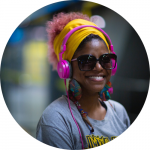 Breaking Green Ceilings Podcast amplifying the voices of environmentalists from historically underrepresented communities including Disabled, Queer, Trans, Black, Indigenous, People of Color and accomplices (episodes 1 hour)
Breaking Green Ceilings Podcast amplifying the voices of environmentalists from historically underrepresented communities including Disabled, Queer, Trans, Black, Indigenous, People of Color and accomplices (episodes 1 hour)
Louder Than A Riot Hosted by NPR Music's Rodney Carmichael and Sidney Madden this podcast reveals the interconnected rise of hip-hop and mass incarceration and explores power from all angles — the power the music industry wields over artists, the power of institutional forces that marginalize communities of color, the power of the prison industrial complex and the power dynamics deep-rooted in the rap game (episodes 1 hour)
Introducing: Nice White Parents From Serial and The New York Times, reporter Chana Joffe-Walt looks at the 60-year relationship between white parents and the public school down the block. Includes reading list and discussion guide, calls in/out white progressives (episodes1 hour)
Teaching To Thrive Podcast hosts Bettina Love & Chelsey Culley-Love share ideas that strengthen the everyday lives of Black and Brown students within our schools and communities. Each episode is aimed at empowering our knowledge for collective liberation (episodes 20 - 40 mins)
Black Voices in Healthcare Podcast by the acclaimed medical storytelling community The Nocturnists who, in the wake of the murder of George Floyd, invited in Black medical community luminaries, Ashley McMullen, MD and Kimberly Manning, MD, to host this series about how being Black shapes medical workers’ personal and professional lives (episodes 30 mins - 1 hour)
Do the Work Podcast hosted by Brandon Kyle Goodman explores race and relationships. Each episode is an intimate conversation between two people who know each other well, and have had or are still having a struggle to cross the racial barrier. We bring them together so they can finally have a real conversation about race, and we can all learn how to be anti-racist in our daily lives. Debby Irving has a small role in each episode (episodes 30 - 50 mins)
1619 A New York Times audio series, hosted by Nikole Hannah-Jones, that examines how slavery has transformed America, connecting past and present through the oldest form of storytelling (episodes 30 - 45 mins)
Left of Black Duke University Professor of African and African American Studies Mark Anthony Neal interviews Black Studies in arts, education, music, sports, and more. Bonus: interviews also available to view on YouTube (episodes 20 mins - 1 hour)
All My Relations, hosted by Matika Wilbur (Swinomish and Tulalip) and Adrienne Keene (Cherokee Nation) this podcast “explores indigeneity in all its complexity.” Episodes focus on issues such as DNA identity, appropriation, feminism, food sovereignty, gender, sexuality, and more while “keeping it real, playing games, laughing a lot, and even crying sometimes” (any episode – one-ish hour each
Black Like Me, host Dr. Alex Gee “invites you to experience the world through the perspective of one Black man, one conversation, one story, or even one rant at a time” (any episode – times vary)
On Point Radio – Oklahoma To Incorporate 1921 Tulsa Race Massacre Into Statewide School Curriculum host David Folkenflik interviews Tulsans about the 1921 “Black Wall Street” race massacre and recent efforts to integrate it into the Oklahoma education system (46 minutes)
Here & Now – Without Slavery, Would The U.S. Be The Leading Economic Power? host Jeremy Hobson explores with Edward Baptist, author of The Half Has Never Been Told: Slavery and the Making of American Capitalism, how slavery established the United States as a world economic power (15 minutes)
NPR Morning Edition – You Cannot Divorce Race From Immigration journalist Rachel Martin talks to Pulitzer Prize-winning journalist Jose Antonio Vargas for a response to a story in The Atlantic, written by David Frum, proposing the U.S. cut legal immigration by half. (6 minutes)
BBC Radio 5 live – The Sista Collective – Created and hosted by BBC producer Jessie Aru-Phillips, each season showcases the depth of Black British talent. (any episode – one-ish hour each)
You could also choose a song from the Soundtrack4Justice playlist below.
 Short, Coffee Break Length
Short, Coffee Break Length
I'm not your inspiration, thank you very much TED Talk by comedian and journalist Stella Young who happens to go about her day in a wheelchair — a fact that doesn't, she'd like to make clear, automatically turn her into a noble inspiration to all humanity. In this very funny talk, Young breaks down society's habit of turning disabled people into "inspiration porn" (9 mins)
How Can We Win Author Kimberly Jones gives a powerful, spontaneous, eloquent speech explaining in detail why this is happening (racism across 450 years) and the difference between protesting, rioting and looting in 2020 (7 mins)
White Backlash Against Progress: The 3rd Reconstruction Rev William Barber explains the challenges and opportunities in the 1st, 2nd, and now possibility 3rd reconstruction period (7 mins)
You love Black culture, but do you love me? Powerful Beats By Dre spot challenging the appropriation of Black culture amidst ongoing lack of challenge to the racist systems that continue to oppress Black communities (2 mins)
Entrepreneur Pharrell Williams and JAY-Z soundtrack set to rolling images and stories of Black entrepreneurs (5 mins)
Systemic Racism Explained Act.TV animated short illustrates how systemic racism affects every area of U.S. from incarceration to predatory lending, and how we can solve it (4 mins)
The American Lows, Excerpt Jacqueline Battalora talks about how white supremacy permeates all aspects of American society (4 mins)
Defund the Police Project Nia & Blue Seat Studios explain the racist origins of U.S. policing, and paint a vision for what shifting resources from police budgets to housing, food, and other basic life needs can look like (4 mins)
How 'white fragility' reinforces racism Dr. Robin DiAngelo explains what white fragility is and how it functions (5 minutes)
Not Everyone is Your Friend by Trent Shelton speaks to the negative pull we can feel from old friends when we try to spread our wings (3 mins each)
This is Us, Dr. Eddie Glaude explains why blaming current racial tensions on Donald Trump misses the point (3 minutes)
The Iroquois Influence on the Constitution, Host and producer of First Voices Indigenous Radio Tiokasin Ghosthorse explains the sequestering of two Iroquois chiefs to advise in the writing of the U.S. Constitution (4 minutes)
Racism is Real, A split-screen video depicting the differential in the white and black lived experience (3 minutes)
Confronting ‘intergroup anxiety’: Can you try to hard to be fair? Explores why we may get tongue tied and blunder when we encounter people from groups unfamiliar to us (5 minutes)
I Didn’t Tell You, Ever wonder what a day in the life of a person of color is like? Listen to this poem, written and spoken by Norma Johnson (7 minutes)
CBS News Analysis: Students May Be Miseducation About Black History, Ibram X. Kendi reviews current history curriculum production and use across the U.S. (5 minutes)
The Disturbing History of the Suburbs, An Adam Ruins Everything episode that quickly and humorously educates how redlining came to be (6 minutes)
New York Times Op-Docs on Race, Multiple videos with a range of racial and ethnic perspectives on the lived experience of racism in the US (each video about 6 minutes)
White Bred, Excellent quick intro to how white supremacy shapes white lives and perception (5 minutes)
What Kind of Asian Are You? Humorous two minute youtube video that illustrates the utter silliness of the way many white Americans interact with Asian Americans (2 minutes)
What Would You Do?: Bicycle Thief Episode ABC’s popular show explores the impact of racial and gender bias and prejudice at a family friendly park. Before this video, would you have anticipated this differential treatment?
Medium, Lunch Break Length
Munroe Bergdorf on racism, trans activism and acceptance English activist and model Munroe Bergdorf, known for speaking her mind on trans issues, racism and misogyny, talks to Krishnan Guru-Murthy about her own transition, the controversy that led to her being dropped by L'Oreal and why tolerance is not enough (38 mins)
I’ve lived as a man & a woman -- here’s what I learned TED talk by Paula Stone Williams about the surprising injustices she discovered in transitioning from a male to a female body (15 mins)
Why racial and ethnic data on COVID-19’s impact is badly needed American Medical Association (AMA) April 2020 Live Stream with panelists from a diverse range of association leaders explain racial and ethnic healthcare barriers and equity approaches (1 hour)
What Being Hispanic and Latinx Means in the United States, Fernanda Ponce shares what she’s learning about the misunderstanding and related mistreatment of the incredibly diverse ethnic category people in U.S. call Hispanic. (12 minutes)
Indigenous People React to Indigenous Representation in Film And TV, Conversation with a diverse range of Indigenous people by FBE about media depictions of Indigenous people, Columbus day, and Indigenous identity. (15 minutes)
The urgency of intersectionality, TED Talk by Kimberlé Crenshaw that asks us to see the ways Black women have been invisibilized in the law and in media. (19 minutes)
How to overcome our biases? Walk boldly toward them, TED Talk by Vernā Myers, encourages work vigorously to counter balance bias by connecting with and learning about and from the groups we fear (19 minutes)
Racial Wealth Gap Vox Explained series episode digging into why measuring racial progress must include understanding the roots and dynamics of the Black/white racial wealth gap (16 mins)
‘We the People’ - the three most misunderstood words in US history TED Talk by Mark Charles offers a unique perspective on three of the most misinterpreted words in American History and their connection to obstructing life, liberty, and justice for all people (17mins)
Long, Sit On the Couch Length
Documented Pulitzer Prize-winning journalist Jose Antonio Vargas uses his personal story to convey the internal and external impacts of the US’s broken immigration system. Also available on Amazon Prime (1 hour 30 minutes)
Race In America: Fighting for Justice Bryan Stevenson interview with Washington Post columnist Jonathan Capehart delves into the state of US racism and racial justice as of October 2020 and explores the role of hope in staying the course (1 hour)
The Force A fly-on-the-wall look deep inside the long-troubled Oakland Police Department as it struggles to rebuild public trust (1 hour 32 mins)
When they see us, Four-part Netflix series by Ava DuVernay about the wrongful incarceration and ultimate exoneration of the “Central Park Five.” (four 1+ hour episodes)
13th, Netflix documentary by Ava DuVernay about the connection between US Slavery and the present day mass incarceration system. (1 hour 40 minutes)
Slavery by Another Name, 90 minutes PBS documentary challenges the idea that slavery ended with the emancipation proclamation. (90 minutes)
Unnatural Causes, Seven part documentary by California Newsreel that explores the impact of racism on health and US healthcare. (4 hours total, episodes have variable lengths)
In The White Man’s Image PBS documentary about the Native American boarding school movement designed to “kill the Indian and save the man.” (56 minutes)
Race: The Power of an Illusion, Three-part, three-hour film by California Newsreel exploring the biology of skin color, the concept of assimilation, and the history of institutional racism. (three 1 hour episodes)
Who Killed Malcom X? Six-episode Netflix series exploring the decades-long investigation into who was behind the assasignation of Malcom X and the mis/reporting of it (episodes 40 minutes)
 Once people start to learn about white privilege and America’s systems of oppression through history, they often ask, “Why didn’t I see this sooner?” It’s easy to overlook what we’re not looking for. Once you understand the phenomenon of selective noticing, take yourself on a noticing adventure.
Once people start to learn about white privilege and America’s systems of oppression through history, they often ask, “Why didn’t I see this sooner?” It’s easy to overlook what we’re not looking for. Once you understand the phenomenon of selective noticing, take yourself on a noticing adventure.
1) Watch the Test Your Awareness: Do The Test
2) Go out in the world and change up what you notice. (Some of this will be influenced differently pre/during/post COVID. You may need to rely on memories until we are on the move again!) Here’s some of what you might look for:
- Who is and is not represented in ads?
- Who are your ten closest friends? What is the racial mix in this group?
- As you move through the day, what’s the racial composition of the people around you? On your commute? At the coffee shop you go to? At the gym? At your workplace? At the show you go on the weekend?
- What percentage of the day are you able to be with people of your own racial identity?
- Notice how much of your day you are speaking about racism. Who are you engaging with on these issues? Who are you not? Why do you think this is?
- What are the last five books you read? What is the racial mix of the authors?
- What is the racial mix of the main characters in your favorite TV shows? Movies?
- What is the racial mix of people pictured in the photos and artwork in your home? In your friend, family, and colleagues’ homes?
- Who is filling what kinds of jobs/social roles in your world? (e.g. Who’s the store manager and who’s stocking the shelves? Who’s waiting on tables and who’s busing the food?) Can you correlate any of this to racial identity?
- Who do you notice on magazine covers? What roles are people of color filling in these images?
- If you’re traveling by car, train, or air, do you notice housing patterns? How is housing arranged? Who lives near the downtown commerce area and who does not? Who lives near the waterfront and who does not? Who lives in industrial areas and who does not? What is the density of a given neighborhood? Can you correlate any of this to racial identity?
3) Review the Continuum on Becoming an Anti-Racist, Multicultural Institution with a small group of people at your workplace, faith institution, club, or any organization you’re a part of.
Where do you think the organization is right now?
What’s your evidence?
Has the organization evolved in some ways?
What caused/allowed for that?
Has the organization articulated a desire to evolve towards being an anti-racist, multicultural organization?
If not, do you have the power to influence that movement?
Who are your in-organization and/or stakeholder allies?
If yes, what steps is it taking?
Could it be doing more? If so what?
Who are your in-organization and/or stakeholder allies?
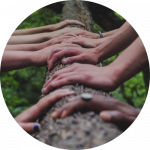 Follow Racial Justice activists, educators, organizations, and movements on social media. Consider connecting with any of the people /organizations you learn about in the above resources. Here are more ideas to widen your circle of who you follow. Pro Tip: check out who these organizations follow, quote, repost, and retweet to find more people/organizations to follow.
Follow Racial Justice activists, educators, organizations, and movements on social media. Consider connecting with any of the people /organizations you learn about in the above resources. Here are more ideas to widen your circle of who you follow. Pro Tip: check out who these organizations follow, quote, repost, and retweet to find more people/organizations to follow.
National Center for Transgender Equality | Twitter | Instagram | Facebook
Movement for Black Lives | Twitter | Instagram | Facebook
Dream Defenders | Twitter | Instagram | Facebook
Asian & Pacific Islander American Health Forum: APIAHF | Twitter | Instagram | Facebook
United We Dream | Twitter | Instagram | Facebook
The Philanthropy Initiative | Twitter
National Congress of American Indians | Twitter | Facebook
Antiracism Center | Twitter | Instagram | Facebook
Audre Lorde Project | Twitter | Instagram | Facebook
Black Women’s Blueprint | Twitter | Instagram | Facebook
Color Of Change | Twitter | Instagram | Facebook
Colorlines | Twitter | Instagram | Facebook
The Conscious Kid | Twitter | Instagram | Facebook
Equal Justice Initiative (EJI) | Twitter | Instagram | Facebook
Families Belong Together | Twitter | Instagram | Facebook
The Leadership Conference on Civil & Human Rights | Twitter | Instagram | Facebook
Showing Up for Racial Justice (SURJ) | Twitter | Instagram | Facebook
Teaching Tolerance | Twitter | Instagram | Facebook
Colours of Us | Twitter | Instagram | Facebook
Anti-Defamation League | Twitter | Instagram | Facebook
Nonprofit AF | Twitter | Instagram | Facebook
Define American | Twitter | Instagram | Facebook
AWARE-LA | Twitter | Instagram | Facebook
Privilege to Progress | Twitter | Instagram | Facebook
Black Minds Matter | Twitter
18MillionRising | Twitter | Instagram | Facebook
Black Voters Matter | Twitter | Instagram | Facebook
Teaching While White | Twitter | Facebook
White Nonsense Roundup | Twitter | Instagram | Facebook
Conversations with White People: Talking about race | Facebook
Race Forward | Twitter | Instagram | Facebook
Racial Equity Tools | Twitter | Facebook
1Hood Media | Twitter | Instagram | Facebook
White Awake | Twitter | Facebook
The Transgender Training Institute | Twitter | Instagram | Facebook
 This can be the hardest part for people new to racial justice work. Engaging in racially mixed settings can trigger age-old power and privilege dynamics. The goal is to be a learner more than a knower, exactly the opposite of what dominant U.S. culture teaches us to be.
This can be the hardest part for people new to racial justice work. Engaging in racially mixed settings can trigger age-old power and privilege dynamics. The goal is to be a learner more than a knower, exactly the opposite of what dominant U.S. culture teaches us to be.
Here are some Engagement Tips to guide you:
- Enter the process to learn and bridge knowledge gaps.
- Enter the process to practice mindful social habits like the ones below.
- Work to stay engaged even when your mind and body start sending you signals to shrink or walk away.
- Ask clarifying questions.
- Acknowledge what you don’t know.
- Validate others by listening closely and believing the truth and importance of what they are sharing.
- Share airtime so that multiple perspectives are shared.
- Step Up Step Back. If you are generally quiet, step up and practice speaking more. If you are generally a talker, practice stepping back and listening more.
- Notice your biases and judgments as they arise. These are gold for you to excavate your subconscious!
- Notice when you are uncomfortable. Reflect on why you’re uncomfortable and think about what you can do to build more emotional stamina in this area.
- Honor confidentiality. Though you can share what you are learning in general terms, do not repeat stories in a way that can be traced back to the person who shared it.
- Find a mentor within your own racial group to support and guide your growth.
If you are white, join a Showing Up For Racial Justice (SURJ) chapter in your area.
Google who’s who in your area by typing in ‘Racial Justice” or “Anti-Racist/m” + name of city/town, organization, or sector. A few website visits, emails, and phone calls later, you’ll likely have an idea of how to get on the mailing of one or more organizations in your area who are addressing issues of power and privilege. Once you connect to one, it’s easy to connect to many!
Research racial justice speakers and see who might be coming to your local university, church, community center, or speaker series.
Take a course or workshop. Community Colleges and Adult Education Centers are a great place to find a course about social justice issues.
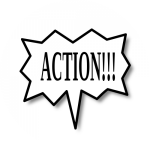 Though many people want to jump to action sooner instead of later, action without a vigorous self-education, self-reflection, and multiracial coalition can unexpectedly reproduce the very power and privilege dynamics we seek to interrupt. That said, sometimes acting immediately is called for. Welcome to the messy, imperfect world of challenging the status quo! Here are a few actions that you might consider:
Though many people want to jump to action sooner instead of later, action without a vigorous self-education, self-reflection, and multiracial coalition can unexpectedly reproduce the very power and privilege dynamics we seek to interrupt. That said, sometimes acting immediately is called for. Welcome to the messy, imperfect world of challenging the status quo! Here are a few actions that you might consider:
- Invite friend(s), family, and/or colleagues to do the 21-Day Challenge with you.
- Prepare yourself to interrupt racial jokes. Click HERE for some advice about how.
- Interrupt the pattern of white silence by speaking openly with family, friends, and colleagues about what you’re doing and learning in the 21-Day Challenge.
- Invite friend(s), family, and/or colleagues to join you for one or more of your daily “to-do’s” for a low-threshold invitation into the work and introduction to the 21-Day Challenge.
- Find out if your school, workplace, or faith group has an Equity Committee. What can you learn from them? Are they open to new members? Join if you can. Support in other ways if you can’t.
- Find organizations such as The Privilege Institute, your local YWCA, and other non-profits doing racial justice work and support them through donating your time, money, and other resources.
- Find a 21-Day Challenge group in your region or sector and reach out to connect with, and perhaps co-create a region or sector specific 21-Day Challenge in the future. Google “21-Day Racial Equity Habit Building Challenge + your state, region, or sector”
- When the status quo is blatantly racist, disrupt it. No matter how big or small put yourself out there to create change. No need to wait until you are comfortable disrupting; it may never get comfortable, though you will get better at managing discomfort. These actions are generally more successful when done in multiracial coalition. Examples from past participants include:
- Demanding administration change the name of a dodgeball team from “The Cottonpickers”
- Improving the representation of books in the library by raising funds and purchasing hundreds of new books
- Conducting an equity audit within the organization
- Creating learning communities to set goals, objectives, and action plans
- Disrupting inappropriate language by offering alternative language you yourself are learning
- Speaking, emailing, and posting about articles, blogs, movies, and this 21-Day Challenge that you find impactful.
Let people know you are not neutral!
 Reflecting and Journaling is a crucial piece of the challenge. Plan to take time everyday to reflect on what you chose to do, what you’re learning, and how you are feeling. Difficult emotions such as shame and anger, though uncomfortable to feel, can guide you to deeper self-awareness about how power and privilege impacts you and the people in your life. At the very least, use the “Reflect” space on the below tracking tool.
Reflecting and Journaling is a crucial piece of the challenge. Plan to take time everyday to reflect on what you chose to do, what you’re learning, and how you are feeling. Difficult emotions such as shame and anger, though uncomfortable to feel, can guide you to deeper self-awareness about how power and privilege impacts you and the people in your life. At the very least, use the “Reflect” space on the below tracking tool.

 Create a Soundtrack4Justice playlist that fuels you and/or can serve as a conversation starter with people of all ages.
Create a Soundtrack4Justice playlist that fuels you and/or can serve as a conversation starter with people of all ages.
You can find ours on Spotify, Youtube, Apple Music, or see individual songs below:
Ain’t Got No, I Got Life / Nina Simone
Baltimore / Nina Simone
Be Free / J Cole
Blended Family / Alicia Keys
Blue Bucket of Gold/Gallant X Sufjan Stevens
Born This Way / Lady Gaga
Brave / Sara Bareilles
Colors in Bloom / Lex Allen ft. Taj Raiden
Fight the Power / Public Enemy
Fight Song / Rachel Platten
Formation / Beyonce
For The Kids / Homeboy Sandman
Four Women / Nina Simone
Give Your Hands to Struggle / Sweet Honey in the Rock
Get Up, Stand Up / Bob Marley
Good As Hell / Lizzo
House Of A Thousand Guitars / Bruce Springsteen
Hijabi / Mona Hayder
If It’s Magic / Stevie Wonder
Keep Your Head Up / Tupac
Love’s In Need of Love Today / Stevie Wonder
Living for the City / Stevie Wonder
Mercedes Benz / Janis Joplin
Ne Me Quitte Pas / Nina Simone
People Get Ready / Curtis Mayfield and The Impressions
Rich Girl / Nina Simone
Roar / Katy Perry
Same As It Ever Was/Michael Franti & Spearhead
Same Love / Macklemore & Ryan Lewis
Save Me / Nina Simone
Stay Human / Michael Franti & Spearhead
Super Rich Kids / Frank Ocean
Strength, Courage & Wisdom / India Arie
The 10 Stop and Frisk Commandments / Jasiri X
The Colour in Anything / James Blake
Try / Colbie Caillat
We The People / Tribe Called Quest
Try Everything / Shakira
Where Is The Love / Black Eyed Peas
White Privilege / Mackelmore
White Privilege II / Macklemore
Whitey on the Moon / Gil Scott-Heron
Stand 4 What / Nick Cannon
This Is America / Childish Gambino
To Be Young Gifted and Black, Nina Simone
Ultra Black / Nas

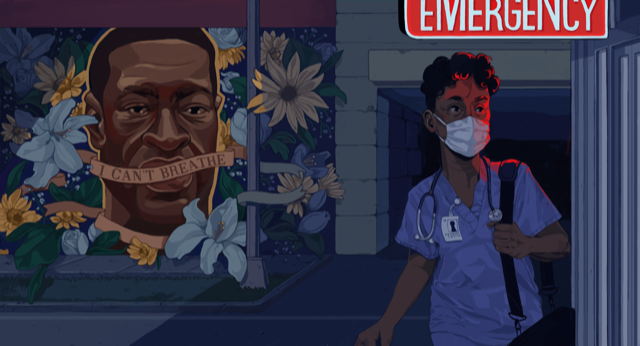

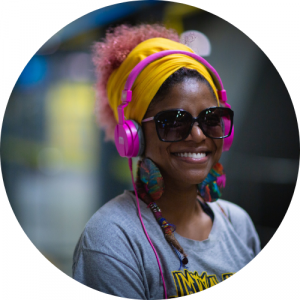


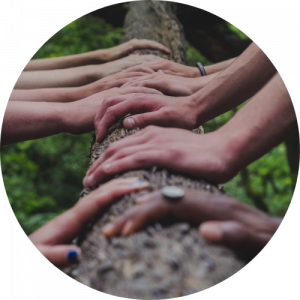
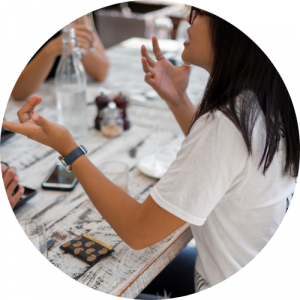
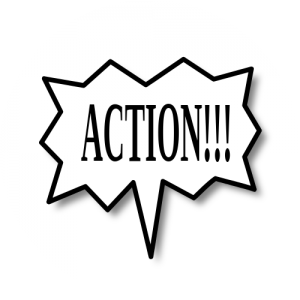


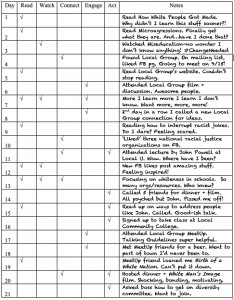
 Short, Coffee Break Length
Short, Coffee Break Length